Article 70: The aroma and taste of coffee in the realm of humanity
Originally a popular drink in long-distance journeys since ancient times, coffee’s spreading path has finally connected the East with the West, creating a bridge between cultures and civilizations.
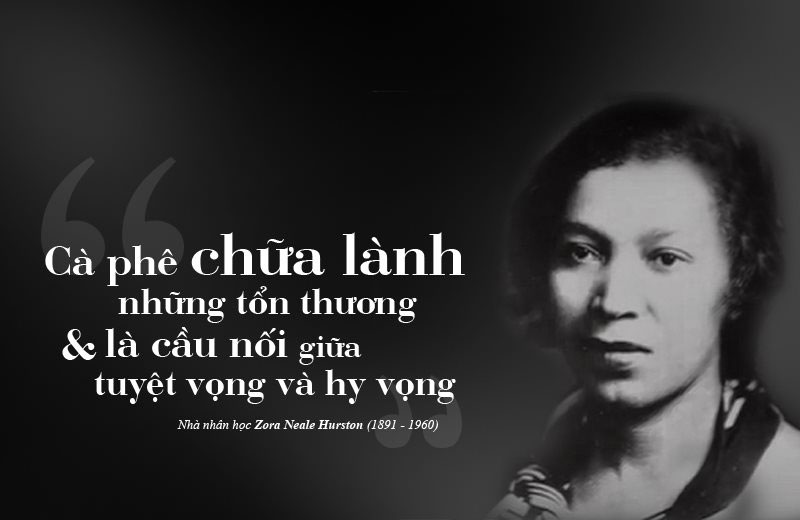
“Coffee heals wounds And a bridge between despair and hope.” – Zora Neale Hurston (1891-1960)
The aroma and taste of coffee – origin and evolution
Coffee beans, when discovered in Ethiopia, were thrown into the fire by monks as a form of exorcism. The pleasant aroma wafted out surprised those standing nearby. They quickly removed the burning coffee beans and put them in water to cool. A monk tasted the water soaked in coffee beans and found that both his body and mind were invigorated. Coffee has since been accepted and respected as a gift from God.
Ethiopians roasted and boiled coffee as a decoction to drink in spiritual rituals. Because of its ability to increase strength, coffee water was also used for healing as a medicine. Meanwhile, the warrior tribes ground the ripe coffee berries, mixed with animal fat to make food to provide energy on the march to expand the territory.
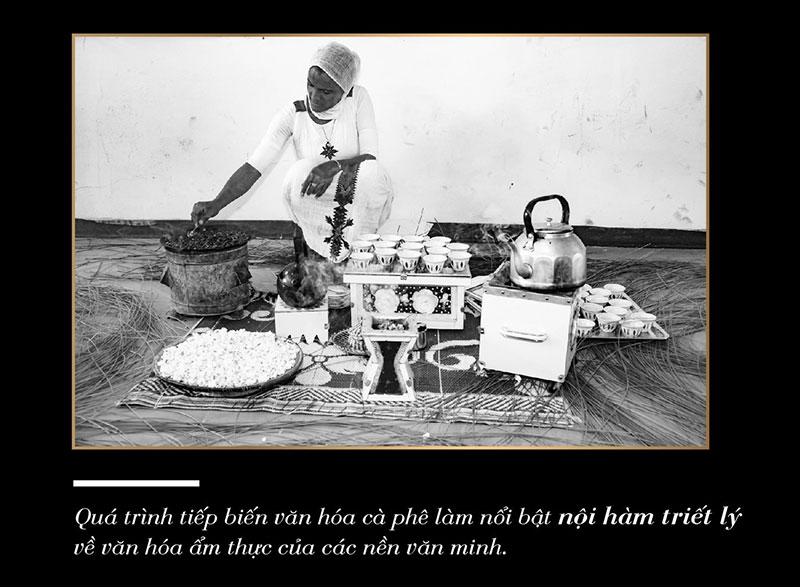
The process of acculturation of coffee highlights the philosophical content of the culinary culture of civilizations
When coffee was introduced into the Ottoman royal family, the style of enjoying coffee took a step forward with the introduction of new brewing methods, tools and serving rituals. In the Ottoman palace, the Sultans (the title of the king in the Islamic empire) specially set up the coffee patrons, who were chosen to perform this task with absolute loyalty to the Sultan and were called Kahvecibaşı. Kahvecibaşı ground roasted coffee beans into a fine powder, boiled them in water, and poured them into golden cups and presented to the Sultan. Some Kahvecibaşı ground coffee with cardamom, cloves, cinnamon to calm the spirit and prolong the aroma on the palate.
Sometimes Kahvecibaşı brews coffee with musk to add aroma variety and richness to both the fore and aftertaste, known as mümessek kahve. Or mix it with ambergris to produce a strong aromatic muenber kahve that is as rich as milk, both slightly sweet and a little salty with the magical touch of ocean salt, whose aromatic taste may last for several days after drinking.
Dialogue between civilizations
Along with the footsteps of pilgrimages, expeditions and medieval international trade routes such as the “fragrance road”, the “spice route”, coffee spread in all directions. Which in turn highlights the meaning of coffee blended with the philosophical implications of the culinary culture of different civilizations in human history.
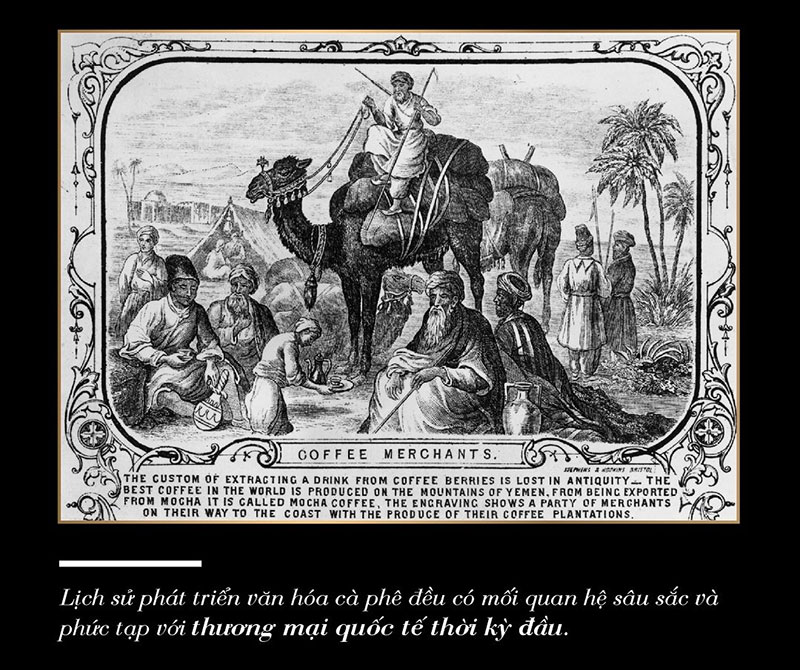
The historical development of coffee culture has a deep and complex relationship with early international trade.
The Ottoman Empire was located in an important position, able to control trade routes across all three continents of Asia – Africa – Europe. In particular, the “ragrance road” connects civilizations from the Mediterranean regions, the Arabian Gulf to India and East Asia; The “spice road” connects the west coast of Japan, the islands of Indonesia, across the Indian Ocean to the lands of the Middle East – and from there across the Mediterranean to Europe. Thanks to trade trips across many great seas connecting strange shores, people had more opportunities to discover the combination of coffee and the rare and precious fragrances – spices of nature.
Coffee mixed with cardamom and cinnamon in the traditional Ottoman style was considered a medicinal drink for people traveling here and there, avoiding falling asleep and cold at night in the middle of the desert. Brewing coffee with black pepper and hot chili peppers, at first glance, sounds like a “mysterious specialty”, but was very popular with merchants on the way to the East. The pungent properties of pepper cover the unpleasant smell of coffee beans that have been rained for a long time, while promoting health in cold weather. The West-ward delegation preferred coffee mixed with cinnamon and honey, which was said to be the drink to prevent sickness against wind and fog for captains and sailors traveling up and down the ocean waves. The journey from India back to Europe by the “spice route on the sea” encountered a north-east monsoon that brought the saltiness of sea salt gradually into the coffee bags located in the ship’s hold to create the Malabar coffee with a salty taste because of iodine.
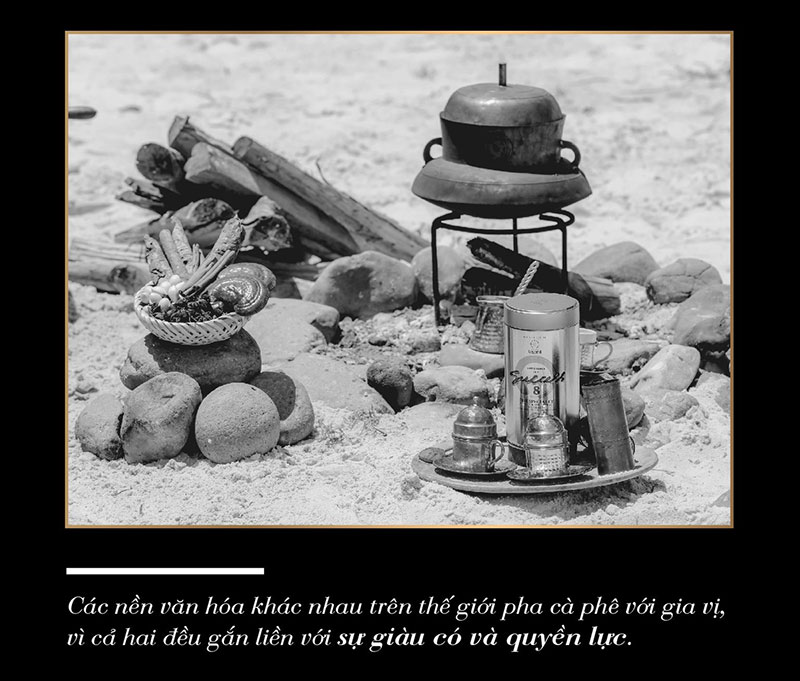
Different cultures around the world brew coffee with the spice, as both were associated with wealth and power.
Also due to the specific characteristics of the geography of spices – fragrances, in many parts of the world, coffee has been enjoyed with the imprint of indigenous beliefs and culinary culture. Cubans have Cuban Espresso that is mixed with cane sugar. The Chinese drink coffee with tea, this drink is called Yuanyang. Ireland – a country with a long tradition of producing whiskey, mixes coffee with whiskey, sugar and a layer of whipped cream. Mexico has Café de Olla that cooks coffee, cinnamon, and piloncillo directly in an enameled earthenware pot. Malaysians roast coffee in palm oil leaving a slightly bitter aftertaste but rich aroma. Indonesians have coffee mixed with lemongrass, jaggery and even with charcoal called Kopi Joss.
In 1660, the Dutch explorer – Johan Nieuhof went to the East and learned how to use milk in the drink of the elite. He added milk to the coffee to make the coffee taste sweeter. And since then, latte has become a favorite, even the standard, in Western coffee recipes. This is also the origin of famous coffee varieties in different countries such as Cappuccino, Latte (Italy), Café au Lait (France), Wiener Melange (Austria), Café Bombón, Café Dulce de Leche (Spain), Galão Coffee (Portugal) Frappé Coffee (Greece),…
The aroma and taste of coffee creates happiness
The strong aroma of coffee is the result of about 50-60 compounds released during the brewing process. Coffee, popular in both hemispheres, has also had an interference with healing medical therapies that have been handed down in the world for thousands of years. In the East, coffee has been used in the Indian philosophy of Ayurvedic medicine and in Chinese herbal healing. In the Mediterranean region, medical scientists extracted coffee essential oil, used in aromatherapy – which the Greeks and Romans considered “nature’s healing power”.
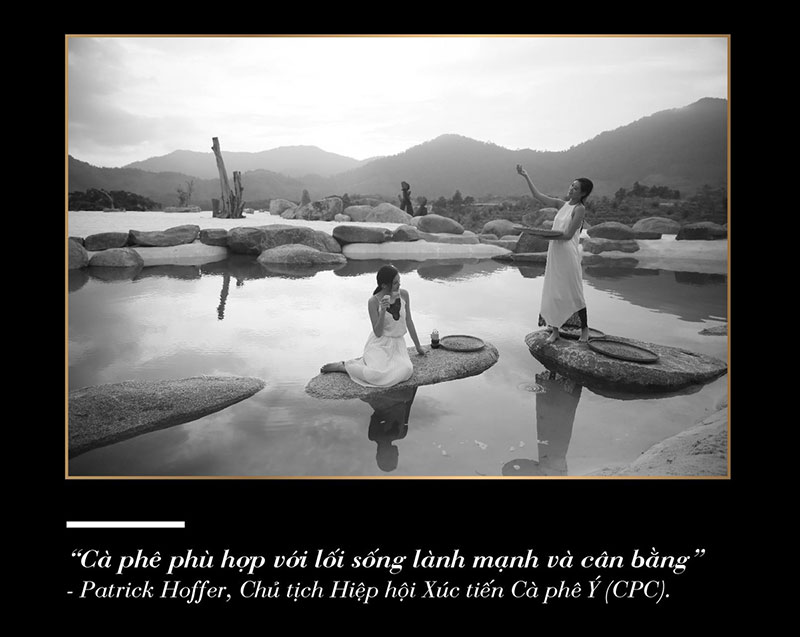
“Coffee is suitable for a healthy and balanced lifestyle” – Patrick Hoffer, President of the Italian Coffee Promotion Committee (CPC).
To this day, there are many scientific studies in both the East and the West confirming that the aroma of coffee can improve memory, increase alertness and increase feelings of happiness. Scientists at Harvard University’s School of Public Health, University of California’s Coffee Center, Temple University, National Institutes of Health (USA), University of Navarra (Spain), Ruhr University (Germany), Seoul National University (Korea), Mae Fah Luang University (Thailand), … have published many studies confirming that coffee aroma regulates mood, cognitive performance, brain waves, heart rate, blood pressure, induces pharmacological, physiological and psychological changes. Therefore, smelling coffee aroma has a positive effect on people’s mental state and cognition, reducing symptoms of stress, depression, and anxiety.
Coffee essential oil has been one of the most comprehensive health care therapies for the body, mind and spirit. Aromatherapy is considered the art of improving quality of life and is recognized both in science and medicine. Currently, around the world, coffee essential oil is used in a number of nutritional, sports, aesthetic, meditation regimens… to help people reach a state of peace and happiness.
THE REAL COFFEE
ROASTED ONLY FOR PEOPLE OF WISDOM!
Source: “The Philosophical Way of Coffee” – copyright by Trung Nguyen Legend


